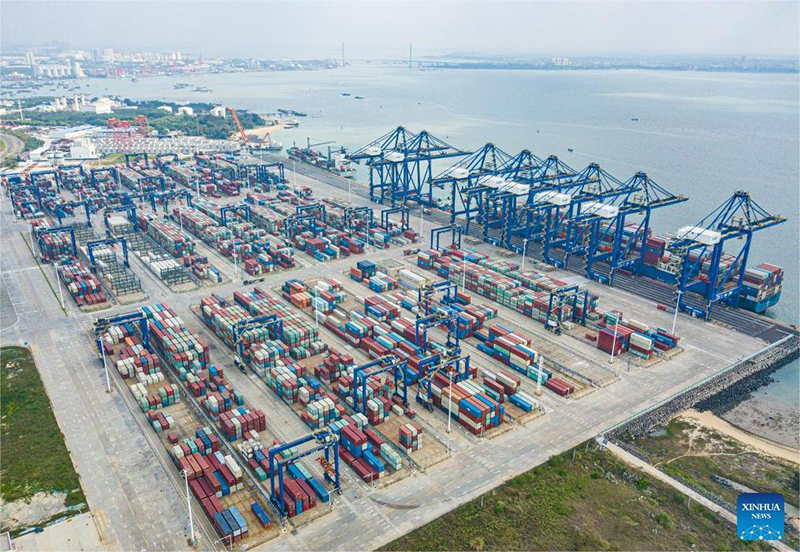Source: Xinhua

For the past three years, China has effectively coordinated COVID-19 prevention and control with economic and social development, with positive results seen and new achievements made on the two fronts, making it a reliable and important driving force of global economic growth.
Specifically, China has maintained the overall stability of its economy, ensured grain supply, kept industrial and supply chains basically stable, and effectively protected people's lives and health.
Globally, there have been over 641 million confirmed cases of COVID-19, including 6.62 million deaths, reported to the World Health Organization, while the incidence rate and the death toll of COVID-19 in China have been the lowest among major countries.
Effective virus control helped China emerge from the epidemic-induced slump, with its economy growing at an average annual rate of more than 5 percent over the past two years, better than the global average.
In 2020, China was among the first countries in the world to resume work and reopen businesses, and registered a 2.3-percent gross domestic product (GDP) growth, making it the world's only major economy to attain positive growth.
Its GDP crossed the 100-trillion-yuan (about 14.37 trillion U.S. dollars) threshold in 2020 and further expanded to over 114 trillion yuan in 2021, contributing over 30 percent to world economic growth.
For 2022, the country has spared no effort to consolidate the upward trend of economic recovery, keep employment and prices stable, and strive for the best possible outcome in economic work.
The past three years were unusual and extraordinary for China as it has withstood multiple tests. However, China has historically eradicated absolute poverty, significantly expanded the size of the middle-income group, completed the building of a moderately prosperous society in all respects, and embarked on a new journey of building a modern socialist country in all respects.
In particular, China, the world's most populous country, is making every effort to ensure grain supply amid growing uncertainties in global food security.
The country's grain output topped 650 billion kg for seven consecutive years by 2021, with the per capita grain supply remaining higher than the internationally recognized security line. This year, China has seen output increases in summer grain and early rice and expects another bumper harvest.
As the world's manufacturing powerhouse, China boasts the world's biggest and most complete industrial system, making it a key contributor to global industrial chains.
In 2020, China's export of medical supplies maintained steady and orderly growth, offering stronger support to the global society in fighting the COVID-19 epidemic. Meanwhile, Chinese manufacturing's added value accounted for 28.5 percent of the global total.
Nowadays, the global economy faces various challenges, and China has offered solid support related to raw materials, production capacity, logistics, and sales for both domestic and foreign companies. By strengthening the resilience of industrial and supply chains, China has helped ease the inflation pressure globally.
Meanwhile, China's determination to open up further to the outside world remains unwavering, providing enormous opportunities for the rest of the world.
In the first 11 months of this year, China's trade in goods expanded 8.6 percent year on year to 38.34 trillion yuan, according to the General Administration of Customs.
The new momentum deriving from deepened efforts in advanced manufacturing has played a solid role in boosting growth. The Belt and Road Initiative, the Regional Comprehensive Economic Partnership, the pilot Free Trade Zone and other major institutional innovations have injected impetus and vitality into the high-quality development of foreign trade, said Zhuang Rui, a professor at the University of International Business and Economics.
The country has also continued widening market access and shortening the negative list for foreign investment. It has put into force the Foreign Investment Law, which took effect on the first day of 2020, to protect foreign investors' legitimate rights and interests.
Backed by these endeavors, China has retained its strong appeal to foreign businesses despite gloomy investment sentiment around the globe. Foreign direct investment in the Chinese mainland, in actual use, went up 17.4 percent year on year to 168.34 billion U.S. dollars in the first 10 months, official data showed.
Next year, the country will pay special attention to ensuring steady growth, employment, and prices, forestall and defuse major risks effectively, and strive to achieve an overall improvement in the country's economic performance, characterized by higher quality and reasonable growth, according to a meeting convened by the Political Bureau of the Communist Party of China Central Committee on Tuesday.
China's economy will still face challenges next year, said Yang Zhiyong, a researcher with the Chinese Academy of Social Sciences. "The meeting urged strengthening policy coordination, which will help maintain policy intensity, and focus on sustained efforts in key areas to ensure steady development and reasonable growth next year.
International Monetary Fund Managing Director Kristalina Georgieva said that they had forecast 3.2 percent growth in China's economy in 2022, improving to 4.4 percent in 2023.
China has fiscal space to boost its economy and counter the downward pressure, Georgieva said, adding that the country is also looking at moving toward a more targeted response for epidemic prevention and control, which could help reduce supply chain interruptions and counteract slowing growth.
Contact: Malinda Huang
Phone: 0086 574 81859815
E-mail: Malinda@kvj.cn
Add: Xindian Road, Haishu, Ningbo, China